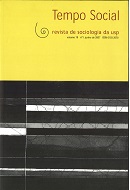Institutional and everyday manifestations of habitus
DOI:
https://doi.org/10.1590/S0103-20702007000100009Keywords:
Habitus, Institutions, Socialization, Symbolic power, Culture, Family interactionAbstract
The article explores the concept of habitus viewed as a process through which babies and children acquire capacities in their daily practices and experiences of socialization within contexts of family interaction, based on data from surveys conducted in Mexico City and Buenos Aires.Downloads
References
BLOOM, P. (2000), How children learn the meaning of words. Cambridge, Massachusetts, MIT Press.
BLUMER, H. (1969), Symbolic interactionism, perspective and method. Englewood Cliffs, Nova Jersey, Prentice-Hall.
BOURDIEU, P. (1977), Outline of a theory of practice. Cambridge, Cambridge University Press.
BOURDIEU, P. (2000), Esquisse d’une théorie de la pratique. Paris, Seuil BOURDIEU, P. & PASSERON, J.-C. (1977), Reproduction in education, society and culture. Londres, Sage.
CAMUS, A. (1946), The stranger. Nova York, Vintage Books.
CICOUREL, A. V. (1978), “Interpretation and summarization: issues in the child’s acquisition of social structure”. In: GLICK, J. & CLARKE-STEWART, K. A. (eds.), The development of social understanding. Nova York, Gardner Press, pp. 251-281.
CICOUREL, A. V. (1993a), “Habitusaspekte im entwicklungs und erwachsenenalter”. In: GEBAUER, G. & WULF, C. (eds.), Praxis und ästhetik: neue perspektiven im denken von Pierre Bourdieu. Frankfurt, Suhrkamp, pp. 148-173.
CICOUREL, A. V. (1993b), “Aspects of structural and processual theories of knowledge”. In: CALHOUN, C., LIPUMA, E. & PONTONE, M. (eds.), Bourdieu: critical perspectives. Cambridge, Polity Press, pp. 89-115.
CICOUREL, A. V. (2004), “L’habitus et le pouvoir symbolique comme processus sociocognitifs: quelques suggestions empiriques”. In: BOUVERESSE, J. & ROCHE, D. (eds.), La liberté par la connaissance: Pierre Bourdieu (1930-2002). Paris, Odile Jacob, pp. 163-188.
EKMAN, P. & FRIESEN, W. V. (1978), Unmasking the face. Englewood Cliffs, Nova Jersey, Prentice-Hall.
GOFFMAN, E. (1961), Asylums: essays on the social situation of mental patients and other inmates. Garden City, Nova York, Anchor Books.
GOPNICK, A. (1993), “How we know our minds: the illusion of first-person knowledge about intentionality”. Behavioral and Brain Sciences, 16: 1-14.
GOPNICK, A. & MELTZOFF, A. (1997), Words, thoughts and theories. Cambridge, Massachusetts, MIT Press.
GREENOUGH, W. T., BLACK, J. E. & WALLACE, C. S. (1987), “Experience and brain development”. Child Development, 58 (3): 539-559.
KARMILOFF-SMITH, A. (1992), Beyond modularity: a developmental perspective on cognitive science. Cambridge, Massachusetts, MIT Press.
KREBS, J. R. & DAVIES, N. B. (1993), An introduction to behavioural ecology. Oxford, Blackwell.
LENOIR, R. (2004), Généalogie de la morale familiale. Paris, Seuil.
MANDLER, J. M. (2004), The foundations of mind: origins of conceptual thought. Nova York, Oxford University Press.
MEAD, G. H. (1934), Mind, self and society. Chicago, University of Chicago Press.
POLLNER, M. (1987), Mundane reason: reality in everyday and sociological discourse. Nova York, Cambridge University Press.
PREMACK, D. (2004), “Is language the key to human intelligence?”. Science, 303 (5656): 318-320.
SCHIEFFELIN, B. (1986), “The acquisition of Kaluli”. In: SLOBIN, D. (ed.), The crosslinguistic study of language acquisition. Hillsdale, Nova Jersey, Erlbaum, pp. 525-593.
SCHIEFFELIN, B. (1990), The give and take of everyday life: language socialization among the Kaluli. Nova York, Cambridge University Press.
SCHÜTZ, A. (1945), “On multiple realities”. Philosophy and Phenomenological Research, 5: 533-575.
SCHÜTZ, A. (1953), “Common-sense and scientific interpretation of human action”. Philosophy and Phenomenological Research, 14: 1-38.
SCHÜTZ, A. (1954), “Concept and theory formation in the social sciences”. Journal of Philosophy, 51 (9): 257-273.
SCHÜTZ, A. (1962), Collected papers I. The problem of social reality. Dordrecht, Kluwer Academic Publishers.
TOMASELLO, M. (1999), The cultural origins of human cognition. Cambridge, Massachusetts, Harvard University Press.
VYGOTSKY, L. (1978), Mind in society: the development of higher psychological processes. Cambridge, Massachusetts, Harvard University Press.
WEBER, M. (1968), Economy and society: an outline of interpretive sociology. 3 vols. Nova York, Bedminster Press.
WHITING, B. (ed.). (1963), Six cultures, studies of child rearing. Nova York, Wiley.
Downloads
Published
Issue
Section
License
Copyright (c) 2015 Tempo Social

This work is licensed under a Creative Commons Attribution-NonCommercial 4.0 International License.


